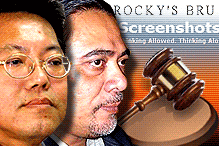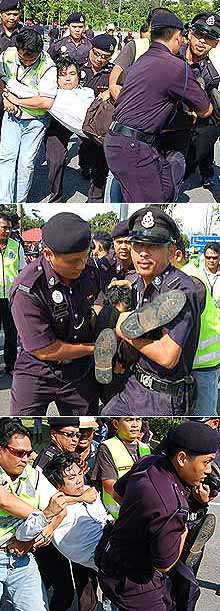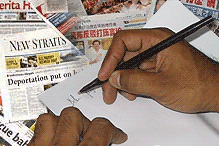The political role of the Internet came to Malaysia in the form of Reformasi websites, following the arrest of former deputy prime minister Anwar Ibrahim in September 1998. Armed with their dial-up connections, early users would eagerly lap up the latest news and gossip from sites such as Mahafiruan (Great Pharaoh), FreeMalaysia and Laman Reformasi .
 Published anonymously, these websites would pour scorn on the prime minister and his cabinet, mixing facts with a healthy dose of myth, speculation and propaganda. Yet, with the mainstream media cowed by government control, these websites developed a strong following, ebbing only when the
Reformasi
movement waned and lost its steam.
Published anonymously, these websites would pour scorn on the prime minister and his cabinet, mixing facts with a healthy dose of myth, speculation and propaganda. Yet, with the mainstream media cowed by government control, these websites developed a strong following, ebbing only when the
Reformasi
movement waned and lost its steam.
In formulating malaysiakini , the founders took a conscious decision to publish a site with a face. We would publish news that matters, and stand behind those posting. All our articles carried bylines. Readers who contributed to the Letters section would have their identity protected, with the editor carrying the responsibility for letters published. Over the past seven years, malaysiakini has successfully built a reputation for credibility.
Bloggers have a similar choice. Remain anonymous and publish as you please or identify yourself as risk legal action for every word that is published.
While there is no licensing for websites, bloggers have to be prepared not only to deal with defamation and libel laws but navigate the gamut of laws that cover publishing and broadcasting. For example, the Sedition Act criminalises any act that incites "hatred", "contempt" or "disaffection" against any ruler, the government or administration of justice. It's a compulsory jail sentence for a crime under the Official Secrets Act, that is to publish a official government document that has not been officially released to the public. There are also provisions within the Printing Presses and Publications Act and the Communications and Multimedia Act that govern what one can and cannot publish.
Bold and sharp
Despite the dangers, Ahirudin Attan aka Rocky and Jeff Ooi did not choose to hide behind the protection of anonymity. They choose to publicly associate with their blogs.
 Neither are they unfamiliar with laws on content and publishing. Jeff contributed to the drafting of the Content Code of the Communications and Multimedia Content Forum. Rocky has worked in the media for 25 years, with his last call of duty heading the
Malay Mail
that dared take on a range of public interest issues, particularly corruption in local government.
Neither are they unfamiliar with laws on content and publishing. Jeff contributed to the drafting of the Content Code of the Communications and Multimedia Content Forum. Rocky has worked in the media for 25 years, with his last call of duty heading the
Malay Mail
that dared take on a range of public interest issues, particularly corruption in local government.
Both blogs are bold and sharp, publishing critical information and views that have put the government, politicians and corporations in the defensive. Knowing the risks, they have to choose their words carefully, exercising self-restraint and self-censorship.
In balancing between publishing and self-censorship, I am sure they would have made mistakes, and perhaps missing the culprits and on some occasions hitting innocent bystanders. By putting their identities to the blogs, they have already taken responsibility for their words and are willing to pay the price.
Hence, it is strange that when the two bloggers above are being sued by the New Straits Times Press and four senior executives for defamation and libel, Prime Minister Abdullah Ahmad Badawi and others have called for "responsible blogging". If Ooi and Rocky wished to be irresponsible, or wished to stay beyond the reach of law, they could choose to do so in many ways and forms and certainly not by publishing a blog under their names.
The rights of the plaintiffs to sue cannot be disputed. Indeed, the law is crafted to ensure that freedom to publish comes with responsibility. However, there are various defences against defamation as outlined by defence counsel Malik Imtiaz Sawar in his blog. Further as pointed out by law professor Azmi Sharom, seeking redress through defamation should not be the first step , especially by a newspaper.
"Any newspaper worth its salt must defend freedom of expression, not curb it, and as such the NST is behaving in a shameful manner. It is shameful because if what these men and their readers said were untrue, then the NST has all the power and facility to oppose it in the best way possible and that is by intelligently and clearly refuting what was said. For God's sake, they are a newspaper. They are not some poor individual who had been defamed and has no other recourse but the law because he has no other option to defend himself."
Political context
The political context of the civil suit looms large. Firstly, the government via the powers of the internal security minister (currently the prime minister) has the absolute discretion to grant or deny a license to print a newspaper. He has total immunity from the judicial process and hence malaysiakini 's application in September 2002 to print a weekly newspaper gathers dust on his desk, as he has refused to make a decision either way.
As expected, such power has not been exercised neutrally. Abdullah's party Umno directly or indirectly owns the New Straits Times Group, Utusan Malaysia as well as Media Prima, forming the dominant media power in Malaysia. The MCA owns Star Publications. Those outside the direct control of political parties, are owned by close allies or subdued by the threat of losing their annual publishing license.
 Ownership and control has rewarded the government with reduced level of accountability and a high degree of impunity for their actions. Take for example the hotly contested issue of toll concessions. Such concessions are awarded without open tender. And the legal agreements are kept secret. Toll rates continue to increase and attempts by the public to question the government are met with deafness. The police refused to allow a peaceful public demonstration by the opposition and civil society in Cheras, leading to 21 arrests and four having to seek medical attention. Oil prices have increased but the government has refused to disclose the accounts of national oil company Petronas. Similarly, water prices have escalated with the government refusing to make public key documents.
Ownership and control has rewarded the government with reduced level of accountability and a high degree of impunity for their actions. Take for example the hotly contested issue of toll concessions. Such concessions are awarded without open tender. And the legal agreements are kept secret. Toll rates continue to increase and attempts by the public to question the government are met with deafness. The police refused to allow a peaceful public demonstration by the opposition and civil society in Cheras, leading to 21 arrests and four having to seek medical attention. Oil prices have increased but the government has refused to disclose the accounts of national oil company Petronas. Similarly, water prices have escalated with the government refusing to make public key documents.
The only media organisation that has been dared to test the boundaries set by licensing has been the Nexnews group that publishes the Sun and business weekly The Edge . Both have boldly carried a variety of hard hitting articles on the toll concession and other current issues of public concern. Nevertheless, I suspect that on many occasions they too have had to curtail their natural impulse for independent reporting, in exchange for long-term survival.
The ruling coalition is also preparing to contest the next election. The propaganda role of the media in promoting the ruling parties that own them and running down the opposition cannot be underestimated. Propaganda works best when alternative news perspectives are kept from the public eye. Blogs and independent media such as malaysiakini pierce through the veil, and offer a different picture of reality.
Commercial context
New Media has caused a drop in newspaper circulations worldwide. Many Internet users have weaned themselves off a newspaper diet, while many youngsters don't see any reason to start buying a paper.
In this regard, malaysiakini is also a victim. Vocal and bold blogs such as Screenshots and Rocky's Bru offer independent minded readers an alternative to paying for malaysiakini . While malaysiakini would argue that our news is well worth a subscription, I have often complained to Ooi that his blog is killing us!
Nevertheless, malaysiakini has maintained a frontpage link to Ooi's blog since its inception. While malaysiakini does not agree with Ooi's views on many issues and despite getting lambasted by some media friends for promoting him, there can be little denial of that he has played a major role in bringing to light critical issues of public concern. If at all malaysiakini is to be faulted, is that we have given Ooi too much support, and at the expense of other important ones. Malaysiakini intends to correct the imbalance by coming up with a method to promote a variety of credible and respected bloggers.
Journalists vs Bloggers
Bloggers also present a threat to professional journalists. A major frustration among journalists is the failure of readers to distinguish between the fusion of opinion, speculation and insider information on a blog as opposed to the researched and edited news article from a reputable media organisation.
 On the other hand, journalists fail to differentiate between the journalism as a profession and the media industry. Like a doctor strives to diagnose and cure a patient, a journalist strives to inform.
On the other hand, journalists fail to differentiate between the journalism as a profession and the media industry. Like a doctor strives to diagnose and cure a patient, a journalist strives to inform.
However, just as private hospitals are commercially driven and directs medical care towards profitability, media managers subject journalists to the whims of advertisers, ownership agendas and government dictates. While couched as 'professional journalism' there is a growing divergence between journalism and the media industry, with readers adopting blogs - rightly or wrongly - as a proxy for genuine journalism and informed opinion.
With bloggers encroaching into the journalist's domain, it is not surprising that some professional journalists view bloggers with trepidation and are quick to point out their cowboy - shooting from the hip style. In response, bloggers ridicule journalists for their silence and cooption as their profession is eroded by the controlling hegemony of the state and profits
It is only in the larger context of freedom of expression that the dichotomy between journalist and bloggers can be resolved. In Malaysia's authoritarian environment, bloggers such as Ooi and Rocky are in the frontline of government action to curtail freedom of expression. As individuals, they are subject to legal, economic and political pressure to conform.
With the elections around the corner and the credibility of the current government shot to pieces by the debacle around water, tolls and petrol prices, it is impossible to see actions of plaintiffs merely within legal rights.
The granting of injunctions that demand the removal of content before the courts make a final and ultimate decision on the matter, creates an avenue for legal censorship that the ruling coalition has been waiting for. Be sure, if the state is successful in ensuring that bloggers kow-tow, it will not be long before other bloggers as well as independent media such as malaysiakini and the Sun will have to choose between shutting up or shutting down.
It is not just bloggers that should unite, but all those who stand for free and responsible expression.
PREMESH CHANDRAN is Malaysiakini's CEO.

